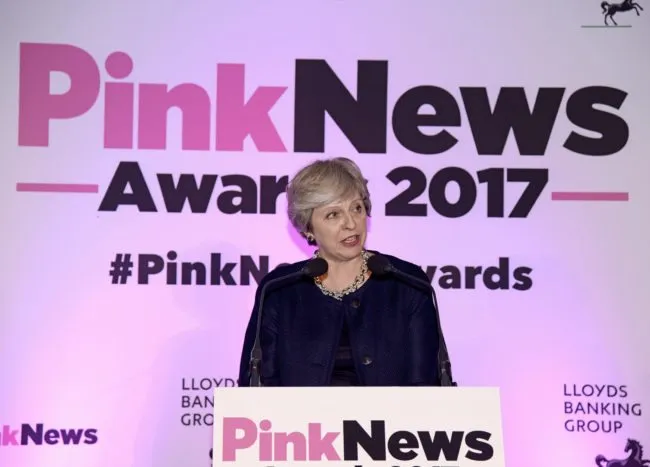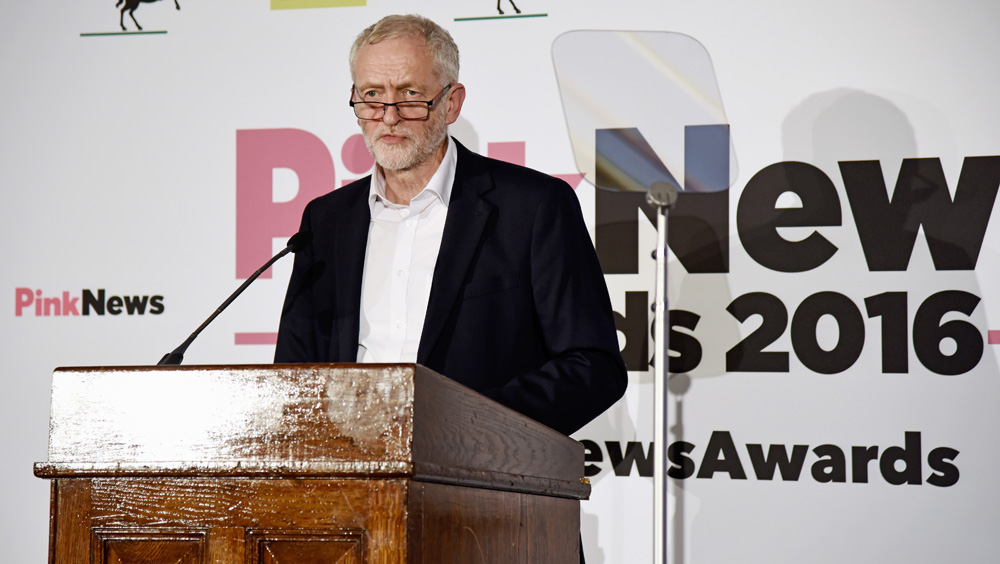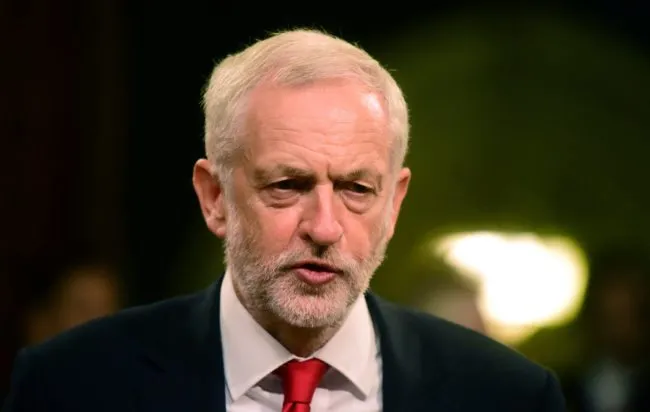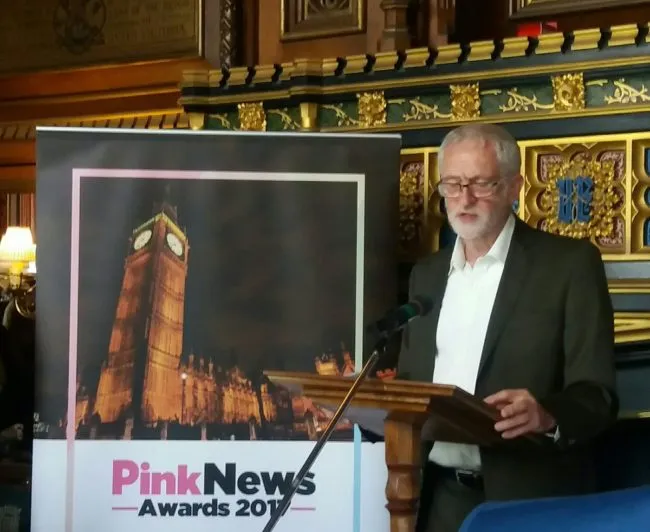Jeremy Corbyn praises Theresa May for pushing forward with transgender rights reforms

Jeremy Corbyn has praised the Prime Minister Theresa May on transgender rights, after she spoke on the issue at the PinkNews Awards.
Speaking at the PinkNews Awards last week, the PM vowed to push on with proposed reforms to the Gender Recognition Act, to make it easier for transgender people to gain legal recognition.
In her speech Mrs May vowed to streamline the process, saying: “Trans people still face indignities and prejudice, when they deserve understanding and respect.
“We have set out plans to reform the Gender Recognition Act, streamlining and de-medicalising the process for changing gender, because being trans is not an illness – and it shouldn’t be treated as such.”

Jeremy Corbyn, who also spoke at the PinkNews Awards, praised Theresa May on the issue during an appearance on LBC today.
In a rare joint appearance with the Labour leader, Mayor of London Sadiq Khan challenged Mr Corbyn to name some of Theresa May’s “good points”.
The Mayor explained: “You and I can both agree on many of the things Theresa May is getting wrong as Prime Minister. You do so across the despatch box every Wednesday, but there must be something you admire about her, or some positivies in Theresa May as a human being.
“People think we politicians hate eachother, from different parties and tribes, and never get on – but one of the things I’ve tried to explain when I meet young people is, we may disagree on policies but we can find the space I hope to be magnanimous and give credit where it’s due for the other side’s good points. Does she have any good points?”
Mr Corbyn said: “I don’t do personal attacks because I think it just diminishes everybody and diminishes politics as a whole.
“Under demand Theresa May did bring in, or support the bringing in, of [reform to] the Gender Recognition Act. She of her own volition has done a lot of work on modern day slavery and I agree with her on that.”

He added: “You look at another person and agree with them and disagree with them. You look for the good points in them, you recognise differences and try and put your own case. That is what I’m trying to do.
“I fundamentally disagree with the political objectives of Theresa May. Obviously I do. I put out our case, she puts out her case, and there’ll be an election some point soon.”
Scroll down for the clip.
Speaking at the PinkNews Summer Parliamentary reception earlier this year, the Labour Party leader had led calls for an overhaul of the 2004 Gender Recognition Act that allows transgender people to change their legal gender.
The current law requires trans people to pass a number of bureaucratic hurdles, wait two years and to submit to medical tests in order to change their legal gender, but Mr Corbyn backed trans campaigners in calling for a ‘self-declaration’ system which would eliminate many of the obstacles.
Addressing the Prime Minister at the time, Mr Corbyn said: “We must advance trans rights, and discrimination has gone on too long. Bring forward a Bill to update the Act and improve trans rights and Labour will back you.”
The government later announced plans to review gender recognition rules.

(Getty)
Equalities Minister Justine Greening confirmed that proposals to streamline and de-medicalise the process for changing gender will be part of a “broad consultation of the legal system that underpins gender transition, the Gender Recognition Act”.
The consultation on the Gender Recognition Act, to be published in the coming months, will look to improve the recognition process and reduce the stigma faced by the trans community.
Proposals will include removing the need for a medical diagnosis of gender dysphoria before being able to apply for gender recognition. The current need to be assessed and diagnosed by clinicians is seen as an intrusive requirement by the trans community.
Options will also be laid out to reduce the length and intrusiveness of the gender recognition system.
A self-declaration system is already in operation in the Republic of Ireland.
The government says it will try to “relieve the bureaucratic and medical burdens for those who choose to change their gender”.
Minister for Women and Equalities Justine Greening said: “This government is committed to building an inclusive society that works for everyone, no matter what their gender or sexuality and today we’re taking the next step forward.
“We will build on the significant progress we have made over the past 50 years, tackling some of the historic prejudices that still persist in our laws and giving LGBT people a real say on the issues affecting them.”
Labour Leader Jeremy Corbyn told PinkNews at the time: “I am delighted that the Government has listened to the demands of LGBT activists and is following Labour’s manifesto commitment. “

“We will vote for any law that improves the rights of trans people.”
Suzanna Hopwood, a member of the Stonewall Trans Advisory Group, said: “I am really pleased that the Government is making good on its commitment to review the Gender Recognition Act. Reform is one of the key priorities in our vision for removing the huge inequalities that trans people face in the UK. The current system is demeaning and broken.
“It’s vital that this reform removes the requirements for medical evidence and an intrusive interview panel, and finally allows all trans people to have their gender legally recognised through a simple administrative process. That’s what we’ll be calling for during this consultation, and I’m looking forward to seeing the law change soon after.”
Ruth Hunt, Chief Executive of Stonewall said: “We’re pleased the Government recognises there is still more to be done to ensure all lesbian, gay, bi and trans people are accepted without exception, and welcome the announcement of new measures to tackle some of the remaining inequalities.
“The consultation on reforming the Gender Recognition Act is hugely encouraging.
“The 2004 Act was ground-breaking in giving trans people a way to have their gender legally recognised, but the process is in dire need of reform.”

